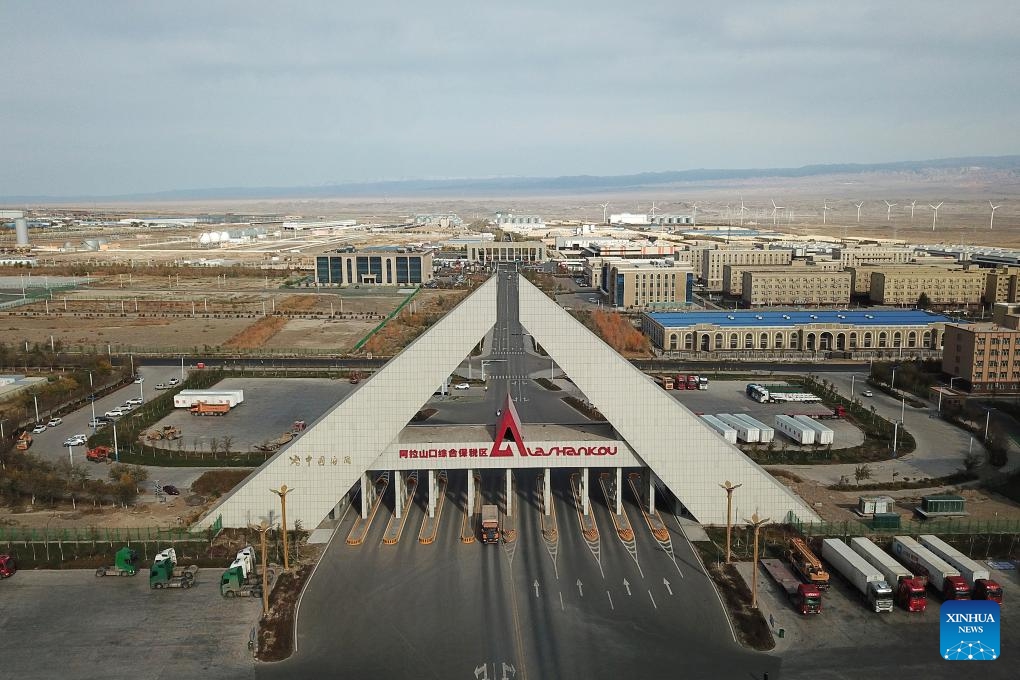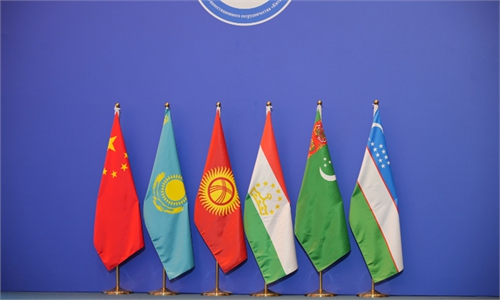Trade, economic cooperation between China, Central Asian countries on fast lane: analyst

This aerial photo taken on Nov. 5, 2023 shows the Alataw Pass comprehensive bonded area in northwest China's Xinjiang Uygur Autonomous Region. Located in the Mongolian Autonomous Prefecture of Bortala in Xinjiang, the Alataw Pass borders Kazakhstan. Since 2011 when the first China-Europe freight train passed through it, the pass has handled more than 30,000 trains to Central Asia or Europe.(Photo: Xinhua)
China's trade and economic cooperation with Central Asian countries has been on a fast lane in recent years and has demonstrated the willingness of the world's second-largest economy to promote common development with countries in the region, Chinese analysts said on Monday.
The remarks came as Chinese Foreign Minister Wang Yi, also a member of the Political Bureau of the Communist Party of China Central Committee, visited the Tajik capital of Dushanbe over the weekend.
China and Tajikistan are ready to explore new measures to further increase the scale of trade, expand agricultural cooperation, and speed up major connectivity projects such as the construction of key sections of the China-Tajikistan highway, Wang said, adding that China will actively consider importing more high-quality Tajik agricultural products.
Wang said bilateral trade grew by more than 50 percent in 2023 but there is still great room for development.
To speed up the two-way flow of people-to-people exchanges, China proposed plans to establish a streamlined personnel exchange platform with Tajikistan, including the issuance of 10-year multiple-entry visas for short-term visitors, such as those for business and family visits, to further facilitate personnel exchanges, according to the Xinhua News Agency.
Chinese analysts said China's trade and economic cooperation with Central Asian countries demonstrated a path of getting along with neighboring countries based on mutual respect, equal treatment, mutual benefit and win-win results.
Zhang Hong, a senior research fellow at the Institute of Russian, Eastern European and Central Asian Studies of the Chinese Academy of Social Sciences, told the Global Times on Monday that China's trade and investment ties with Tajikistan in recent years had proved to be of great value to local socioeconomic development, despite the relatively small scale of such activities.
A number of Chinese companies have been building roads, bridges and tunnels in Tajikistan in recent years, while others have cultivated cotton fields and brought more job opportunities.
Such cooperation built on the foundation of good-neighborliness and mutual trust has highlighted China's approach to treat countries equally regardless of their sizes, and sharing of its growth dividend to the world, Zhang said.
Major projects in the region, such as the China-Kyrgyzstan-Uzbekistan railway, when set in motion, will have a massive positive spillover effect on regional development for countries not directly involved, Zhang noted.
In 2023, China's trade with Central Asian countries reached $89.4 billion, up 27 percent year-on-year, according to customs data.
In the first four months of 2024, China's trade with Kazakhstan, Kyrgyzstan and Uzbekistan all registered double-digit growth rates in dollar terms, underscoring the great potential of economic relations between China and Central Asian countries.
Due to the fast growth of the China-Europe freight train services, railway cargo volume between China and Kazakhstan in 2023 surged by 22 percent year-on-year to 28 million tons, according to Xinhua. Cities including Xi'an in Northwest China's Shaanxi Province became logistics hubs handling the flow of goods between China and Central Asian countries.
In the first quarter, Northwest China's Xinjiang region saw its trade with five Central Asian countries soar by 26.4 percent year-on-year, local news outlet ts.cn reported in April.




